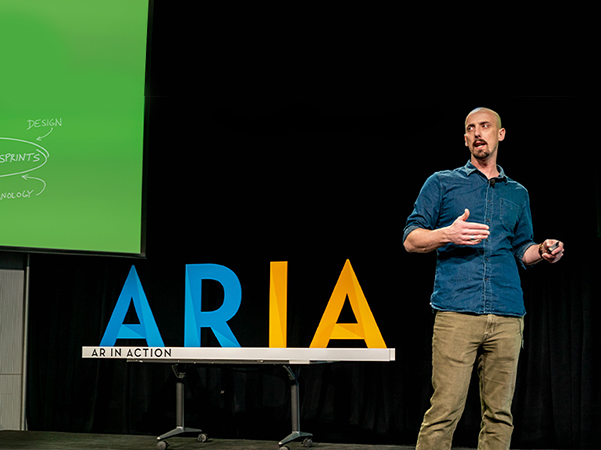
The rapid evolution of augmented reality (AR) means companies need to constantly adapt to a changing digital landscape. PTC University Vice President of Education Products, Ayora Berry, offers a solution called AR Design Sprints, a tangible method that allows teams to align their vision, prototype, and efficiently create AR experiences.
Berry recently spoke at the annual AR in Action conference at MIT. This event brings together software engineers, CEOs, founders, educators and thought leaders in the AR sphere to discuss the latest in software, products, and best practices. Berry’s presentation addressed challenges often seen in the AR creation process. His solution of AR Design Sprints is an efficient and tangible method for prototyping and testing an AR vision.
Sometimes, great ideas never meet their potential because they’re missing key concepts in design. Berry highlighted this obstacle, and others, that teams in industry and the academic space may face. Often times, people are hungry to turn an idea into a reality but aren’t as disciplined in following a systematic method to achieve their goal. A holistic approach, one that looks at AR as a whole and pulls it apart to see every aspect, will take you from building a business case to designing the user experience (UX) and developing the product.
Inspired by author Jake Knapp’s work at Google, Berry and his team broke down the AR creation process in five key steps. The team adapted Knapp’s model of, “understand, sketch, decide, prototype, validate,” and transformed them for the AR creation process. To emphasize these steps, Berry created a slide for visual representation of key activities that, “take the project from a napkin sketch to deployment in the field.”

Understanding the five steps of the AR creation process allows teams to visualize the trajectory of their product development and enables them to quickly bring that project to fruition. Combining the five steps of the AR creation process from Berry’s AR Design Sprints with Vuforia Studio provides all the components needed for students and educators to quickly and easily develop AR experiences.
Vuforia is hosted by PTC to be accessible in a classroom or online. Faster AR authoring through the drag and drop interface makes it easy for students with no prior coding knowledge to learn to navigate the software quickly and effectively.
To see how the creation and design processes are improved with PTC Academic’s software, read how Horst Orsolits MSc and his student Patrick Pirringer used Vuforia® Studio™ and ThingWorx® in a research project focused on smart factory implementation here and visit the PTC Academic page.
Delaney McDevitt is the marketing copywriter for the PTC Academic Marketing team. In her role, she creates content that embodies the Academic team's mission to empower students and educators to succeed in the digital transformation era.
As a professional writer, she has experience in copywriting, editing, email marketing, content strategy, blogging, document design, and creative writing.
©Copyright 2025. All rights reserved by Modelcam Technologies Private Limited PUNE.